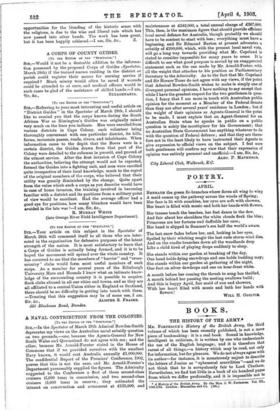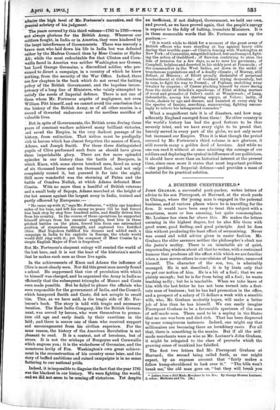BOOKS.
THE HISTORY OF THE ARMY.*
Mn. FORTESCITE'S History of the British .Army, the third volume of which has been recently published, is not a mere piece of bookmaking : it is a real book. Sound in knowledge, intelligent in criticism, it is written by one who understands the use of the English language ; and it is therefore that rarest of all things,—a history which may be read, not only for information, but for pleasure. We do not always agree with its author—for instance, it is monstrously unjust to describe the letters of Junius as "ephemeral scurrilities "—and we do not think that he is scrupulously fair to Lord Chatham. Nevertheless, we find but little in a book of six hundred pages from which we differ profoundly, and it is impossible not to • A History of the British Army. By the Hon. J. W. Forteacue. Vol. III.. 1763-1793. London: Macmillan and Co. (183,1 admire the high level of Mr. Fortescue's narrative, and the general sobriety of his judgment.
The years coveredby this third volume-1763 to 1793—were not always glorious for the British Army. Wherever our soldiers fought, in India or in America, they were hindered by the inept interference of Governments. There was scarcely a brave man who laid down his life in India but was defeated (either by the Madras Council than by Meer Cossim or Hyder , while the most redoubtable foe that Clinton and Corn- , wallis faced in America was neither Washington nor Greene,
-but Lord George Germaine, a discredited soldier, who pre- stimed to direct a campaign, in a country of which he knew nothing, from the security of the War Office. Indeed, there are few chapters in the book which do not reveal the halting -policy of the British Government, and the hopeless incom- petency of a long line of Ministers, who vainly attempted to satisfy- the needs of Imperial defence. There is not one of them whom Mr. Fortescue acquits of negligence, not even William Pitt himself, and we cannot avoid the conclusion that the history of the British Army, as of all other armies, is a record of thwarted endeavour and the needless sacrifice of valuable lives.
: But in spite of Governments, the British arms during these years Of constant warfare achieved many brilliant victories, and saved the Empire, in the very darkest passage of its history, from extinction. That nation must be prodigally rich in heroes which has almost forgotten the names of Knox, Adams, and Joseph Smith. For these three distinguished pupils of Clive performed such feats as should have given them imperishable glory. There are few more splendid episodes' in our history than the battle of Beerpore, in which Knox, with some eleven hundred men, faced an army of six thousand horse and ten thousand foot, and not only completely routed it, but pursued it far into the night.
Still more wonderful was the storming of Patna and the battle of Oondwa Nullah, at which Adams defeated Meer Cossim. With no more than a handful of British veterans
and a small body of Sepoys, Adams marched at the height of the hot season against the largest army in India, trained and partly officered by Europeans
"He came up with it," says Mr. Fortescue, "within one hundred miles of his base, and left his enemy no peace till he had forced him back step by step four hundred miles, and finally driven him from his country. In the course of these operations he supported himself always from his enemies' supplies, beat him in three pitched battles on the plain, forced him from one entrenched position of stupendous strength, and captured two fortified cities. Had Napoleon fulfilled his dreams and added such a campaign in India to his exploits in Europe, the whole world would still ring with it ; yet the conquest of Meer Cossim by a simple English Major of Foot is forgotten." _
But Mr. Fortescue's eloquent eulogy will remind the world of the lost hero, and it is not the least of the historian's merits that he makes such men as these live again.
In the achievements of Knox and Adams the influence of Olive is most clearly seen. Nor did this great man merely found
a school. He suppressed that -vice of peculation with which he himself was charged, and he organised the Army in India so
efficiently that the subsequent triumphs of Munro and Coote were made possible. But he failed to please the officials who were responsible for the government of India, and the Council, which hampered Smith and Coote, did not scruple to recall him. This, as we have said, is the tragic side of Mr. For- tescue's book. The story is tad with tragic and necessary iteration. The East India Company, like the British Govern-
ment, was served by heroes, who' wore themselves to prema- Lure old, age and early death by their exertions in the kid; and there is scarce one of them who received support IS encouragement from his eivilian superiorS. For the lame reason, the history of the American Revolution is not pleasant to read. It is a contest, not of heroisms, but of errors. It is not the mishaps of Burgoyne and Cornwallis
which engross you; it is the wickedness of Germaine, and the monstrous levity of Fox. Washington's own great achieve- ment in the reconstruction of his country came later, and the story of baffled ambitions and ruined campaigns is in no sense flattering to our national pride.
Indeed, it is impossible to disguise the fact that the year 1781 was the blackest in our history. We were fighting the world, atul we did. net seem to be coining off victorious. Yet despite
an inefficient, if not disloyal, Government, we held our own, and proved, as we have proved again, that the people'aenergy is superior to the folly of halting, irresolute Ministers. It is in these memorable words that Mr. Fortescue sums up the position :— "It is worth while to think for a moment of the great array of British officers who were standing at bay against heavy odds during that terrible year—of Clinton fencing with Washington at New York ; of Cornwallis, misguided indeed, but undismayed, fight- ing the action of Guildford ; of Rawdon contriving to stem the tide of invasion for a few days, so as to save his garrisons; of Campbell, helpless and deserted in his sickly post at Pensacola ; of the commanders in the West Indies, set down in the midst of treacherous populations and of a deadly climate ; of Murray, still defiant, at Minorca ; of Eliott proudly disdainful of perpetual bombardment at Gibraltar ; of Goddard trying desperately, but in vain, to fight his way to Poonah ; of Popham snatching away Gwalior by surprise ; of Camac plucking himself by sheer daring from the midst of Scindia's squadrons; of Flint making mortars of wood and grenades of fuller's earth at Wandewash ; of Lang, indomitable, among his starving sepoys, at Velem ; lastly, of Coote, shaken by age and disease, and haunted at every step by the spectre of famine, marching, manoeuvring, fighting unceas- ingly to relieve his beleaguered comrades."
What a magnificent tale it is of disasters, and how mag- nificently England emerged from them ! No other country in the world's history has had the good, fortune to be thus severely tried, and we have every right to be proud that, bravely served in every part of the globe, we not only saved but increased our Empire. Thus it is that though the period covered by Mr. Fortescue's third volume is not glorious, it still records many a golden deed of heroism. And while no one can read it without at once admiring the courage of our soldiers and deploring the cynical indifference of our politicians, it should have more than an historical interest at the present time, since once more it states that most important problem —the problem of Imperial defence—and provides a mass of material for its practical solution.











































 Previous page
Previous page